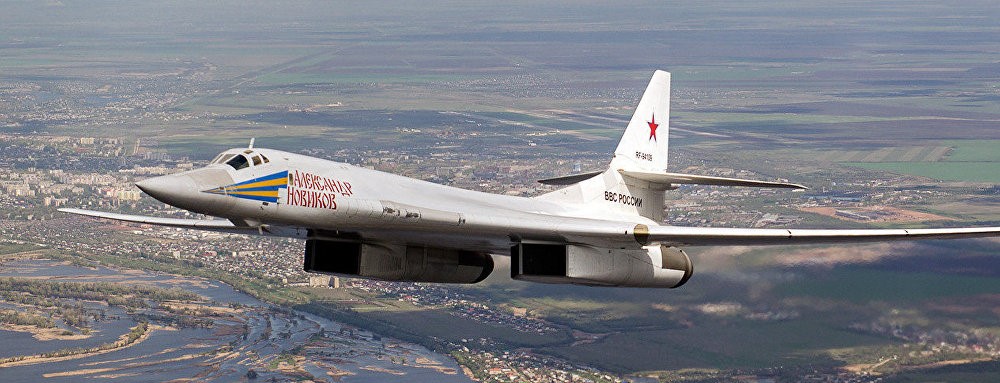Russia deploys bombers to Venezuela
December 12, 2018 | Expert Insights

Two Russian nuclear-capable strategic bombers arrived in Venezuela, a deployment that comes amid soaring Russia-U.S. tensions.
The deployment of these long-range bombers comes just a week after a crucial meeting between Presidents Putin and Maduro.
Background
Venezuela is one of Russia's most important trading and military allies in Latin America (after Brazil), making a strong bond in the bilateral relations between the two nations. Much of this is through the sale of military equipment; since 2005, Venezuela has purchased more than $4 billion worth of arms from Russia. During the crisis in Bolivarian Venezuela, in an article of Russia's Military-Industrial Courier, a journal popular with military officers of the Russian Armed Forces recommended that the Russian government provide military intelligence to the Bolivarian government, and assist proxy leftist militant forces to maintain the Bolivarian government's power. Maduro, who took over following the death of Hugo Chávez in 2013, has come under strong pressure from Donald Trump’s administration, which calls him a “dictator”.
While he won the May elections, most of the international community did not recognise the results. Formally, Maduro’s second mandate only begins in January next year. Hit by low oil prices, mismanagement and the impact of US sanctions, Venezuela is in freefall and Maduro is seeking support from allies after winning a second presidential term this year. Food and medicine shortages have sparked an exodus of some 2 million people. The International Monetary Fund projects hyperinflation of 10% next year.
The Tupolev Tu-160 is a supersonic, variable-sweep wing heavy strategic bomber designed by the Tupolev Design Bureau in the Soviet Union. It is the largest and heaviest combat aircraft, the fastest bomber now in use and the largest and heaviest variable-sweep wing airplane ever flown.
Entering service in 1987, the Tu-160 was the last strategic bomber designed for the Soviet Union. As of 2018, the Russian Air Force, Long Range Aviation branch has at least 16 aircraft in service.
Analysis
Russia’s Defense Ministry said a pair of Tu-160 bombers landed at Maiquetia airport outside Caracas following a 10,000-km (6,200-mile) flight. It didn’t say if the bombers were carrying any weapons and didn’t say how long they will stay in Venezuela.
The ministry said a heavy-lift An-124 Ruslan cargo plane and an Il-62 passenger plane accompanied the bombers to Maiquetia.
The Tu-160 is capable of carrying conventional or nuclear-tipped cruise missiles with a range of 5,500 km (3,410 miles). Such bombers took part in Russia’s campaign in Syria, where they launched conventionally armed Kh-101 cruise missiles for the first time in combat.
The bombers’ deployment follows Venezuelan President Nicolas Maduro’s recent visit to Moscow in a bid to shore up political and economic assistance even as his country has been struggling to pay billions of dollars owed to Russia.
Russia is a major political ally of Venezuela, which has become increasingly isolated in the world under growing sanctions led by the U.S. and the European Union, which accuse Maduro of undermining democratic institutions to hold onto power while overseeing an economic and political crisis that is worse than the Great Depression.
Russian Defense Minister Sergei Shoigu said at last week’s meeting with his Venezuelan counterpart, Vladimir Padrino Lopez, that Russia would continue to send its military aircraft and warships to visit Venezuela as part of bilateral military cooperation.
Russia sent its Tu-160 strategic bombers and a missile cruiser to visit Venezuela in 2008 amid tensions with the U.S. after Russia’s brief war with Georgia.
Russia-U.S. relations are currently at post-Cold War lows over Ukraine, the war in Syria and allegations of Russian meddling in the 2016 U.S. election. Russia has bristled at the U.S. and other NATO allies deploying their troops and weapons near its borders.
Assessment
Our assessment is that Putin’s support is mutually beneficial: Maduro gets support from a global leader like Putin and Russia has access to one of South America’s most strategically located airfields. We believe that Putin is aware that both the political and economic situation is very fluid in Venezuela and that he has looked at Russia’s long-term strategic interests to befriend an unorthodox leader like Maduro. We believe that this is a sign that Russia intends to extend its strategic depth far away from Moscow.








Comments